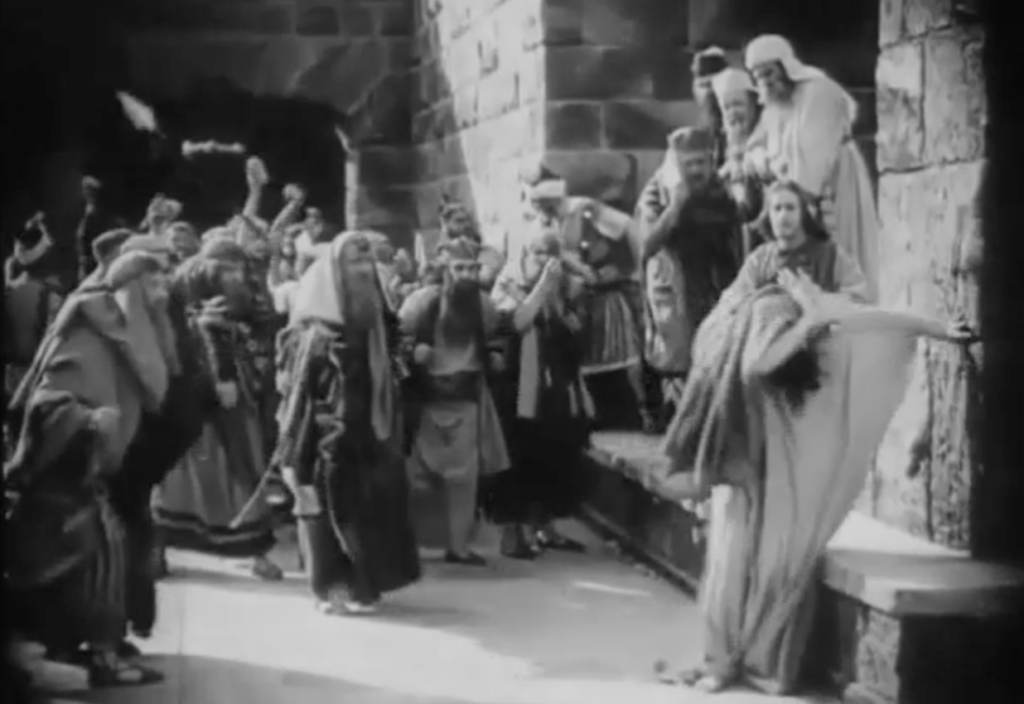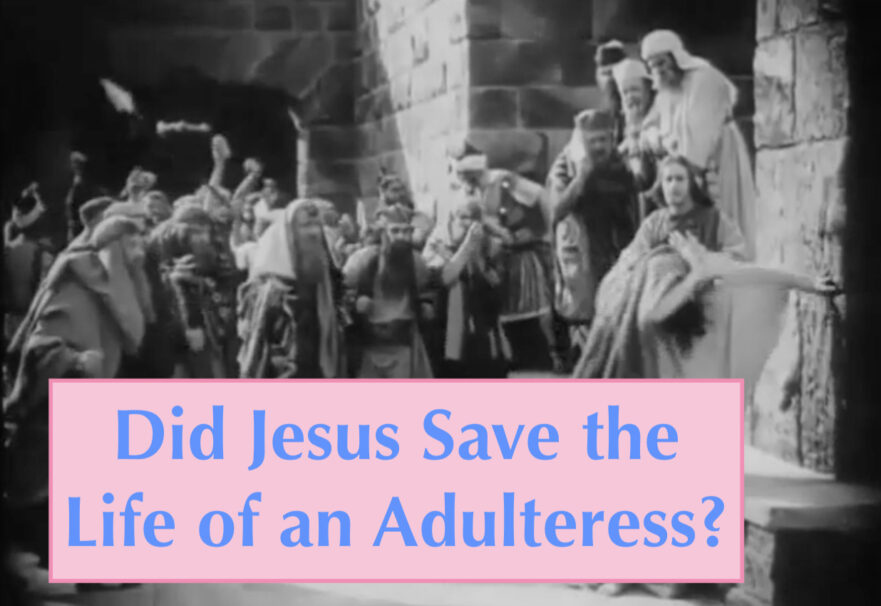How to cite this article: Guido Baltes, “Did Jesus Save the Life of an Adulteress?” Jerusalem Perspective (2021) [https://www.jerusalemperspective.com/22176/].
| Rather listen instead? |
| JP members can click the link below for an audio version of this essay.[*]
Paid Content
Premium Members and Friends of JP must be signed in to view this content. If you are not a Premium Member or Friend, please consider registering. Prices start at $5/month if paid annually, with other options for monthly and quarterly and more: Sign Up For Premium  |
Premium Members and Friends of JP must be signed in to view this content.
If you are not a Premium Member or Friend, please consider registering. Prices start at $5/month if paid annually, with other options for monthly and quarterly and more: Sign Up For Premium
We all know the scene well. We have seen it in all the Jesus movies. An angry mob, led by old, male Jewish religious leaders, drags along a half-naked, young woman, barely wrapped in a bedsheet, and toss her to the ground at Jesus’ feet. In their hands they hold the stones ready to hurl them at her at any moment. In their eyes we see fury and the joyful anticipation of bringing a sinner to justice with their very own hands. However, at the last moment, the woman is saved from death by the words that Jesus spoke: “Whoever among you is without sin, let him cast the first stone” (John 8:7).
But did this story, as we know it, actually happen? I doubt it. My doubts are not the usual doubts of a critical scholar, however. It is true that many biblical scholars today would deny this story ever happened, but that is because they deny the historical reliability of the Gospels as a whole. But this is not the kind of skepticism I mean.
Premium Members and Friends of JP must be signed in to view this content.
If you are not a Premium Member or Friend, please consider registering. Prices start at $5/month if paid annually, with other options for monthly and quarterly and more: Sign Up For Premium

Premium Members and Friends of JP must be signed in to view this content.
If you are not a Premium Member or Friend, please consider registering. Prices start at $5/month if paid annually, with other options for monthly and quarterly and more: Sign Up For Premium
- [1] Brad H. Young, “‘Save the adulteress!’ Ancient Jewish Responsa in the Gospels?", New Testament Studies 41 (1995): 59-70. ↩
- [2] Mishna Sotah 9:9 and b. Sot. 47a, cf. Num. 5:11-31. ↩
- [3] See b. Sanh. 41a and Sifre Devarim §242 on Deut 22:24. ↩
- [4] R. Steven Notley, "Let Him Who Is Without Sin...," Jerusalem Perspective Online. ↩
- [5] Cf. the dictum ascribed to Hillel: “Judge not your neighbor lest you find yourself in his place!” (m. Avot 2:3). ↩
- [6] Cf. David Bivin, “Matthew 5:17: 'Destroy' the Law,” Jerusalem Perspective Online. ↩
- [7] Martin Buber, “Pharisäertum,” in: Der Jude, Sonderheft. Antisemitismus und jüdisches Volkstum, (Berlin: Jüdischer Verlag, 1925), 125-131 (here: 124 and 127-128); republished in Martin Buber: Werkausgabe, Vol. 9 (Gütersloh, 2017), 87-95. Translation mine. ↩
- [8] See m. Yoma 4:2 and 6:8, with reference to Isa. 1:18. ↩
- [9] For more on Jesus' saying in Matt. 5:18, see David N. Bivin and Joshua N. Tilton, “The Significance of Jesus’ Words 'Not One Jot or One Tittle Will Pass from the Law' (Matt. 5:18)”—JP. ↩
- [10] Young notes that though rabbinic ‘responsa’ are a literary genre from much later centuries, the present story might be an indicator that there were early precedents already in the New Testament era. ↩




Comments 3
This post really odd – I think you do not understand the passages that appears on the surface to be more Shammaic.
– The hasidim were sin fearers – this is is hasidic notion not a shammaic one.
– The divorce interpretation from Jesus is about Herod; it must be read in context. Jesus was lenient on divorce. Steven Notley has the seal on this one.
– Jesus came to uphold the Law, but what does that mean? It means Jesus came to uphold HIS midrahim of the Law. This becomes a much different claim with this context in mind.
Ryan,
I don’t understand why you say Jesus was lenient on divorce. Paul knew of no exceptions to Jesus’ prohibition against divorce (1 Cor. 7:10-11) and of all the Gospels, only Matthew allows an exception in the case of porneia (“sexual transgression”) (Matt. 5:32; 19:9). That doesn’t sound lenient to me. It sounds pretty strict.
Joseph’s decision to divorce Mary quietly after discovering her (supposedly) illicit pregnancy (Matt. 1:19) is a good example of the author’s contention that divorce is a more historically plausible scenario in cases of adultery than stoning. Thank you, Baltes, for this illuminating new take on a story we all thought we knew so well.